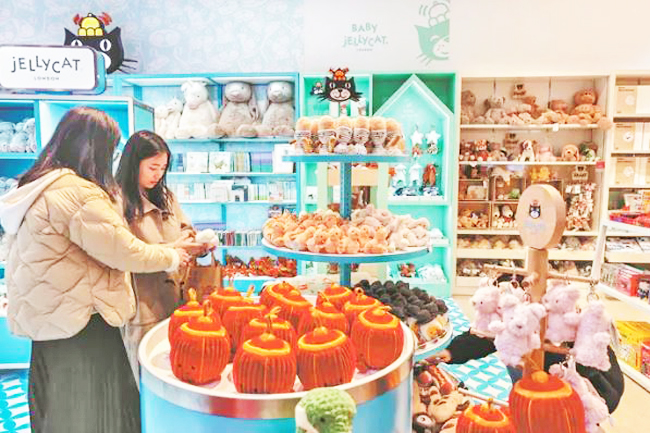ANN/THE STAR – A normal-sized plush toy retails for around CNY50 (USD6.9) on average in China. However, a 31-centimetre version plush toy from London-based toymaker Jellycat is priced at CNY399 or more, and flies off the shelves the moment it becomes available.
These soft and cuddly toys have managed to transcend the traditional toy market, appealing to the emotional and psychological needs of young adults who are increasingly seeking comfort, companionship and a sense of self-expression through their purchases, analysts said. Jellycat’s products are defined by two key characteristics: instantly recognisable features like button eyes, tiny feet and endearing smiles, as well as whimsical, anthropomorphic designs that bring the plush toys to life. Its social media accounts have a unique way of addressing their plush toys, referring to them as “furry friends” and “retired employees” when products are discontinued.

The brand regularly shares the “daily lives” of their characters, even running “employee of the month” contests. By cultivating an immersive brand world, the company has managed to forge strong emotional bonds with its consumers, who believe that their Jellycat friends possess genuine personalities and souls, said founding director of the China Institute of New Economy Zhu Keli. For sophomore student at Beijing Language and Culture University Weng Huayu, the connection to her Jellycat plush orange she bought in 2023 goes far beyond a simple purchase.
Weng, who goes by the online nickname “Big Orange”, felt an instant kinship with the toy. “I felt like there was a special bond between us,” Weng said. “I started bringing it to class with me, and now I take it everywhere.
I’ve really grown to love it.” In Weng’s eyes, her Jellycat plush orange has a warm, easygoing personality. “It’s a bit naughty as well – it often runs away when I try to take photos of it.
It loves to play hide-and-seek and will hide in real orange piles. It also enjoys traveling, and we’ve been to many places together.” During her travels, Weng always makes sure to take plenty of photos of the plush toy with the scenic backdrops and posts those in her WeChat moments.
On social media platform Xiaohongshu – also known as RedNote – users like Weng who treat Jellycat plush toys as children are far from uncommon. Many consumers have embraced Jellycat products as lifestyle companions, taking them along to class, meals, work and while traveling. Some have even gone so far as to create dedicated social media accounts for their Jellycat plush toys, chronicling the “daily lives” of these furry companions.
Zhu said that Jellycat’s ability to imbue its products with distinct personalities and backstories has been instrumental in fostering these deep, almost anthropomorphic bonds between consumers and the plush toys. “By creating a sense of individuality and lifelike features around their products, Jellycat has enabled consumers to see these plush toys as more than just inanimate objects, but also as friends, companions, and even extensions of their own identity,” Zhu added. This user-generated content has become a powerful marketing tool.
Each post, photo or video is not just an advertisement – it’s a personal story that resonates with others. These stories, amplified by social media algorithms, create a ripple effect, inspiring others to buy into the same emotional experience, Zhu said. As of February 21, a search for “Jellycat” on Xiaohongshu yielded over 1.
69 million posts. Moreover, during last year’s “Double 11” online shopping spree, which took place from October 31 to November 11, 2024, Jellycat’s store on Alibaba’s e-commerce platform Tmall saw sales exceed CNY100 million. In addition to e-commerce platforms like JD.
com, Tmall, and Xiaohongshu, Jellycat – unlike many global brands – has no self-operated brick-and-mortar stores in China. Instead, it relies on third-party retailers, including maternal stores, bookstores and coffee shops, often operated by well-known chain brands. “Authorised dealers are finding it quite challenging to maintain adequate inventory, often having to scramble to secure the latest Jellycat releases and popular items,” said Chen Yingjie, owner of a bookstore in Shanghai.
“My store needs to restock Jellycat merchandise every one to two weeks.”.















